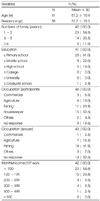Abstract
Hazardous chemicals, such as polycyclic aromatic hydrocarbons (PAHs), volatile organic compounds (VOCs) and heavy metals, are known as being harmful to human health were included in oils released by the Herbei Spirit Oil Spill accident in December 2007. To investigate changes of eating habits by the exposure to harmful substances, we conducted 5 focus group interviews for residents at Taean coast areas, who had experienced the oil spill accident. Participants included 46 women (mean age: 57.2 ± 10.9) who were mainly responsible for preparing family meals. Focus group discussions were audio-taped, transcribed and categorized by themes. Participants expressed more frequent illness symptoms such as dizziness, vomiting, visual loss, and skin diseases after the accident. They mentioned that their worries about economic hardship and worsened health status since the accident induced mental problems, such as depression about their children. Regarding eating habits, participants reported less intakes of fishes and meats and relatively more intakes of vegetables and kimchi due to the lack of household incomes after the accident. Although the participants had been used to collecting or catching fish or shellfish for their consumption previously, they mainly purchased these foods from local markets after the accident. Changes of eating habits induced by the accident included drinking boiled water and having steamed or fried seafood rather than raw seafood. Changes of food intakes occurred less frequently in older adults due to their long-term fixed eating habits, although they felt uncomfortable for having raw fish. The findings of this study clearly present that the exposure of hazardous substances by the oil spill accident had a significant impact on changes in eating habits besides economic, physical, and mental problems among the residents in Taean. Continuous health and nutrition monitoring and support are needed.
Figures and Tables
References
1. Glaser BG, Strauss Al. The discovery of grounded theory: strategies for qualitative research. 1967. Chicago: Aldine Publishing Company.
2. Korean Ocean Research and Development Institute. Data of analysis results of hebei spirit crude oil. 2008. Ansan: marine safety and pollution response research department, Korean Ocean Research and Development Institute.
3. Krueger RA. Focus group interviewing : A practical guide for applied research. 1994. 2nd ed. St. Paul, MN:
4. Lee CH, Park KH, Lee MJ, Choi WH, Kim H, Park CH, Kim DS, Yu SD. Health effect assessment on volunteers involved in the clean-up operation following the hebei spirit oil spill along the Taean coast, Korea. Korean J Occup Environ Med. 2010. 22(1):11–19.
5. Lee SM, Ha MN, Kim EJ, Jeong WC, Hur JI, Park SG, Kwon HJ, Hong YC, Ha EH, Lee JS, Chung BC, Lee JA, Im HS, Choi YY, Cho YM, Cheong HK. The effects of wearing protective devices among residents and volunteers participating in the cleanup of the hebei spirit oil spill. J Prev Med Public Health. 2009. 42(2):89–95.
6. Song MK, Hong YC, Cheong HK, Ha MN, Kwon HJ, Ha EH, Choi YY, Jeong WC, Hur JI, Lee SM, Kim EJ. Psychological health in residents participating in clean-up works of hebei spirit oil spill. J Prev Med Public Health. 2009. 42(2):82–88.
7. Ryu CH. Disappearance of 46 species of fish in Taean. Seoul Newspaper 2007.12.19, p.11. 2007. Available from http://www.seoul.co.kr/news/newsView.php?id=20071219011011.




 PDF
PDF ePub
ePub Citation
Citation Print
Print




 XML Download
XML Download